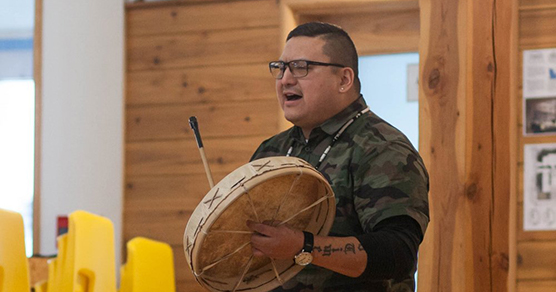« Indigenous Housing » Ideas Competition | L’École d’architecture de l’Université Laval et la firme Pivot terminent en 1ère et 3e place
Excerpt of press release :
“ARCHITECTS WITHOUT BORDERS CANADA DESIGN COMPETITION SEEKS IDEAS FOR BETTER INDIGENOUS HOUSING
Striving to raise awareness of Indigenous Housing in Canada and improve opportunities available to design, deliver and maintain housing for remote access Indigenous Canadians, Architects Without Borders Canada in partnership with the Manitoba Association of Architects has launched an international ideas competition. Winners of the competition were announced and awards presented February 8 at the Circle of Life Thunderbird House, in association with the Aboriginal Council of Winnipeg. Three winners were awarded prizes totaling $10,000.
Architects Without Borders Canada is committed to bringing people together to work collaboratively with communities in need. The Indigenous Housing Ideas Competition Canada was developed based on this core principle, building bridges between different individuals and groups, Indigenous and non-Indigenous, to create greater understanding of key issues and explore better ways of living for remote access Indigenous Canadians.
There are over 600 Indigenous Communities in Canada with over 60 ethnic groups located in diverse landscapes, many with remote access. Historically Indigenous Housing was a local response to requirements for shelter. Communities were often nomadic, dwellings were designed based on the need for frequent movement of people and an understanding of materials available as well as natural properties such as ventilation.
[…]
The winning entry by Marie-Claude Gravel, Pierre-Olivier Demeule and Antonin Boulanger Cartier from the École d’architecture de l’Universite Laval in Quebec City, conceives a new housing development strategy for the Inuit community of Salluit in Nunavik based on addressing place, community and sustainability. Groups of housing: The Neighbors, The Twins and the Three Sisters, are arranged in communities around a tempered climate weather protected shared space for storage of hunting and fishing equipment and preparation of game.
Second place winner Evan Taylor of Winnipeg presented an overall design process to carefully unravel and unpack community issues on an individual and regional basis. A framework of ideas and understanding of remote building is proposed to be collected through a series of iterative small stories as opposed to top-down universal solutions noting that key issues affecting housing are interdependent and often beyond the dwelling itself.
Third place winner, Egest Gjinali, Suzanne Laure Doucet and Colleen Lashuk of Pivot: Coopérative D’architecture, from Montreal, proposes a new housing strategy for an Indigenous community in northern Quebec based on an incremental design approach. Construction material is shipped to site in containers which are then insulated and used as structural and spatial organizing elements to construct housing. Local design and materials from the community are incorporated as finishing elements. A variety of dwelling units are provided within a robust form and growth model.
”
To consult the original press release…
